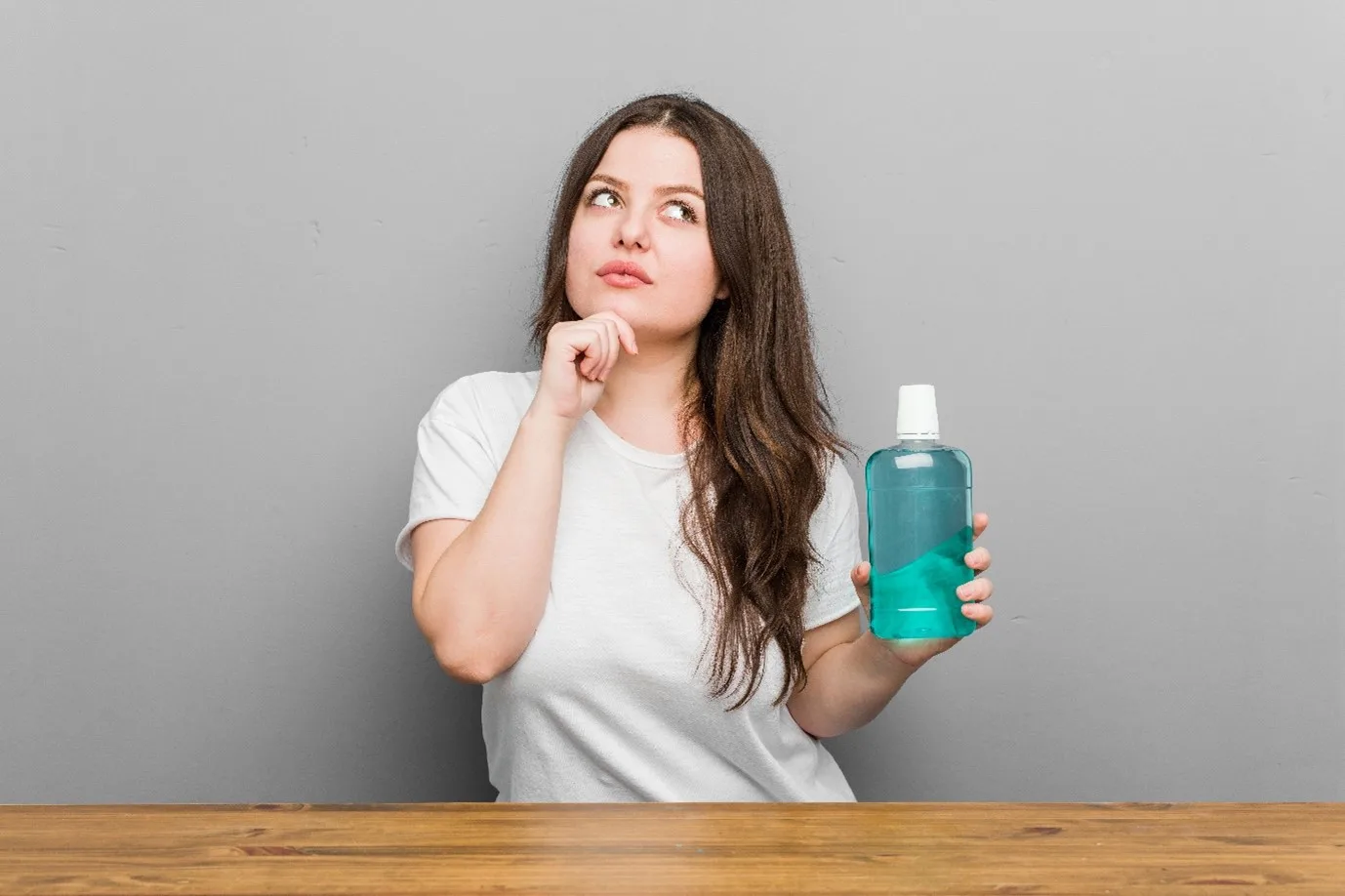Does Mouthwash help you get rid of Dandruff?

Dentists and other practitioners generally recommend that you use mouthwash for your teeth. It can get rid of plaque and bad breath, while increasing the hygiene levels in your mouth. But these people probably didn’t think you’d use the mouthwash for dandruff.
Mouthwash is a mixture of different extracts and chemicals, like fluorides, chlorides, essential oils, or hydrogen peroxide. It contains anti-septic and anti-fungal properties that can potentially kill the bacteria found in your mouth. And this is one of the reasons why people use mouthwash for dandruff.
Why do people use mouthwash for dandruff?
But what does mouthwash actually do on your scalp?
Why does dandruff occur?
Before you apply mouthwash on scalp dandruff, it is important to check the cause of dandruff. Your scalp is covered with sebaceous glands that secrete oil or sebum, which is meant to protect you. However, if your glands get hyperactive and start secreting more oil, it can cause a build-up. This is when a naturally occurring fungus starts feeding on the oil.
This fungus, known as Malassezia Globosa, breaks down the oil into constituents like oleic acid. If your body reacts to this fatty acid, it can trigger scalp itching, redness and flaking of dead skin cells. This is dandruff , and it happens to almost half of the world.
Why do people use mouthwash for dandruff?
It all started when some beauty influencers decided to create a mouthwash dandruff remedy. It was claimed that alcohol in mouthwash – much like in antiseptic treatments – kills off the dandruff-causing microbe, Malessezia Globosa. The alcohol could also get rid of the excess oil that causes your dandruff and keep your scalp dry.
Some mouthwashes contain Menthol, Thyme and Eucalyptus, which have strong anti-fungal properties. Some also contain salicylic acid, which is often used to clear up any breakouts and as a dandruff treatment. All of these ingredients led people to believe that they should use mouthwash on their dandruff.
Some of the claimed methods of using mouthwash for dandruff are:
1. Mouthwash and water –
People create a mixture of water and mouthwash, before spraying it on their hair and scalp. This is usually done after shampoo and conditioner.2. Mouthwash and oil –
Some have also created a mixture of mouthwash with carrier oils like coconut oil or with essential oils like peppermint oil. They apply it to their scalp and wash with a shampoo after 15 minutes.3. Pure mouthwash –
Dabbing cotton swabs full of mouthwash on the scalp is said to get rid of the bacteria. People usually wash with a shampoo after.4. Mouthwash with tea tree oil –
Some search for a mouthwash with tea tree oil as one of the ingredients. Tea tree oil has strong anti-fungal properties and is also one of the popular dandruff home remedies.But what does mouthwash actually do on your scalp?
The bad news is that despite being tried and tested by regulatory bodies around the world, it’s never been proven to work. Mouthwash is not meant to be a scalp shampoo, it’s meant to be used as a mouth cleanser.
The presence of certain anti-fungal chemicals does not discount the other chemicals, such as fluorides and chlorides, that are present in the liquid. These can lead to severely negative reactions on your scalp and hair. Hydrogen peroxide can also cause damage to your scalp.
Some of these mouth cleansers contain strong alcohols that can have an adverse effect on the scalp. They can instantly dry out your hair and scalp, leading to exposed and unprotected skin. This often leads to scalp irritation and inflammation, which can allow infections and germs to creep in.
The risks of using mouthwash for dandruff are:
- Scarring on your scalp.
- Severe burning and stinging.
- Allergic reactions, especially when combined with other hair products.
- Dry hair and dry scalp.
- Hair breakage and hair loss.
- Dry scalp can trigger your body into producing more oil to compensate, which can eventually cause a scalp build-up and aggravate your dandruff.
What should you do instead?
To start with, don’t pour mouthwash on your scalp. The risks outweigh any potential benefits. The main thing is to pay attention to your scalp hygiene, by preventing any build-up of oil. Regular shampoo use and good products can possibly do the trick if that’s all you need.
Your best bet is to use anti dandruff shampoos that can get rid of all visible flakes like the Head and Shoulders Neem. Or if you require something that combines the benefits of a shampoo and conditioner in one, use the Head and Shoulders Cool Menthol 2in1. This can clean your scalp of any dandruff causing germs and restore your damaged hair strands. Instead of using products that are not meant for your scalp and hair, try some which are.



